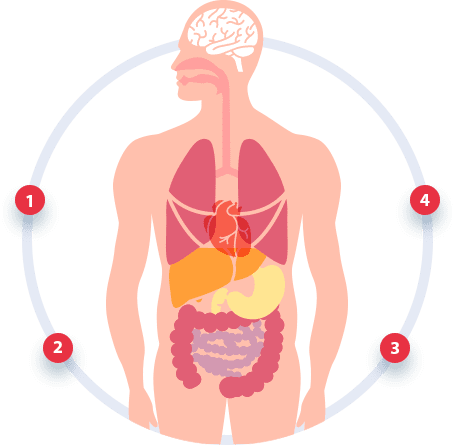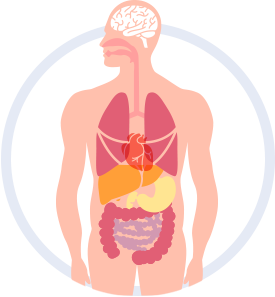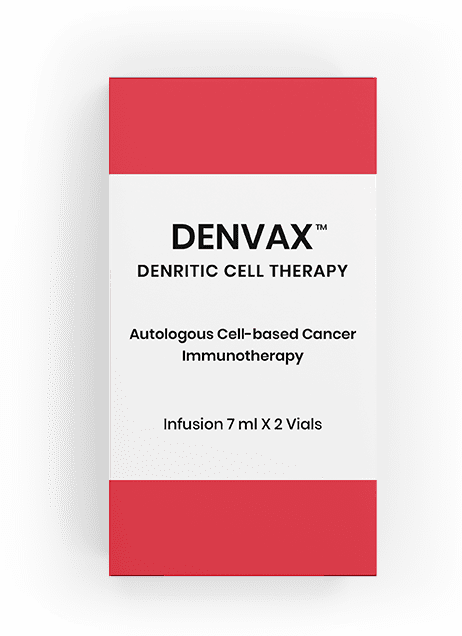

Dendritic Cells are cells of the Immune System that Help in the Fight against Cancer.
Denvax treatment is Customized Dendritic Cell-based Cancer Immunotherapy.
Cancer is no more the end. Today, Thanks to the advanced Medical Technology, it is a treatable disease.


Denvax is personalized cancer medicine, which involves cancer fighting dendritic cells


Denvax is your additional & adjuvant treatment plan


It is a targeted treatment plan. It targets the cancer cells only, without harming the normal cells.


Being non-toxic, it does not interfere with the patient’s treatment plan or daily routine.


Denvax is not a drug; it is a process to rejuvenate the immune system, specifically against cancer.
DENVAX is dendritic cell based cancer immunotherapy. Dendritic cells (DC) therapy delays cancer progression and improves patient survival. At ICT, we have treated a number cancer patients with M1 (metastatic) disease who are leading a recurrence-free quality life for many months to years. We have the experience in treating more than a thousand patients suffering from cancer in various stages of the disease.
DENVAX shows most promise at preventing a recurrence of cancer after surgery, chemotherapy or radiation because the immune system will need to recognize and attack a smaller number of cancer cells.
DENVAX can be given alone or in combination with the other treatment modalities. Dendritic cell therapy comes under the heading of Biological Therapy of Cancer, the fourth modality of cancer treatment after surgery, radiation and chemotherapy.
DENVAX is customized treatment. It is designed to be safe and has minimal side effects. Some patients may experience fever for a day or two after taking DENVAX therapy. The components of DENVAX include patient's own mononuclear cells manipulated into cancer-fighting dendritic cells; there is no graft versus host reaction, or acute-or delayed-type hypersensitivity.
To manufacture DENVAX, patient's own mononuclear cells are collected either by drawing a fresh sample of peripheral blood or by apheresis procedure. The CD14+ cells are isolated and further processed for 8 days to transform them into cancer-specific DC. These dendritic cells are then re-infused into the same patient on the 8th day of drawing blood.
Connect any of our offices to begin your Denvax Treatment
A fresh sample of Peripheral blood (120 ml) of the cancer patient is collected in CellNuteTM medium provided by the Denvax RnD center. The day blood is drawn is considered Day 1 of the protocol.


Denvax is administered intravenously into the patient as an infusion, in 100 ml Dextrose Normal Saline (DNS) in twenty minutes.
Peripheral blood mononuclear (CD14+) cells are isolated. Cells are cultured in cytokines along with desired nutritional media. These cells transform into the immature-dendritic cells. For maturation, the immature dendritic cells are exposed to cancerous antigen, on Day 6.
The mature DCs after a series of confirmatory tests are harvested on Day 8. These are ready for administration to the same patient.
Denvax can be given in both home and hospital settings, as well as under
the guidance of the treating physician.
Denvax helps to reduce pain and suffering in terminal stage patients. It improves quality life and provides palliation to stage IV patients.
A large number of patients show prolongation of life and better clinical outcomes.
A cancer relapse occurs because in spite of the best efforts to get rid of cancer, some cancer cells are left behind. These cancer cells remain dormant for a period of time, but eventually they continue to multiply resulting in recurrence or relapse.
Denvax targets the micrometastasis the disseminated cancer cells responsible for the recurrence and relapse of cancer in treated patients.
Different cancers behave differently, depending upon the stage and characteristics of the cancer, prior cancer treatments, immune responsiveness of the tumor
Majority of the patients irrespective of the stage and disease status have shown improved performance status, weight gain as well as symptom control with use of Denvax.
Patients having minimal tumor load (early stage patients/ recently operated, in whom tumor has been radically removed) show
(a) better results in preventing recurrence of the disease, compared to patients with full blown disease, and
(b) cure is possible in patients who receive the therapy at appropriate stage.
Our experience of over one and a half decade of using Denvax in numerous cancer patients, shows a large group responding or benefitting from this treatment. The benefit can be seen mostly in the form of improved performance status (ECOG, or Karnofsky), improved symptom control, and improved progression-free survival.
A small group, among these patients enter into cure, where they turn repeat PET-CT negative. Overall survival is improved. Once they achieve this stage, we discontinue Denvax therapy after increasing the gap. Alternatively, we may put them on maintenance therapy, until they turn 3 times PET CT negative, conducted at 6 month- interval.
There also exists a small group of patients, who do not respond to the therapy, and may experience no improvement. We are still to find definite answers for this non-responsiveness. For these patients we recommend discontinuation of the treatment.
Most of the patients, receiving Denvax are stage IV, metastatic disease patients. Among these, a large number are those having exhausted all modes of cancer treatment. Most of them have advanced disease.

Treatment based on the revival of immunity against cancer

Non-toxic, being autologous (self-treatment)

Only cancer cells are
targeted


No interference with the patient’s ongoing treatment or daily routine

Additional treatment plan

Not a drug; it is a process to rejuvenate the immune system

A Dendritic cell is a special type of immune cell that boosts immune responses in our body, by showing antigens on its surface to other cells of the immune system.
In cancer, the immune system fails; cells of the immune system fail to recognize the cancer cells.
The immune system doesn’t “see” tumors as dangerous or foreign, and does not mount a strong attack against them.
Another reason tumors may not stimulate an immune response is that cancer cells develop ways to escape the immune system.
A dendritic cell is a special type of immune cell that boosts immune responses in our body, by showing antigens on its surface to other cells of the immune system.
The dendritic cells identify cancer cells, process them into bits, and jump start the immune response by bringing the cancer cells to the attention of. the rest of the immune system.
The activated immune system then circulates throughout the body and destroys cancer cells.
The dendritic cell was discovered by Ralph Steinman in 1973. Steinman, a physician- scientist at the Rockefeller University, New York, thought of using these cells in fighting diseases including HIV and cancer. So when he was diagnosed with advanced pancreatic cancer in 2007, he decided to use his own dendritic cells in fighting the cancer. With collaborators around the world, he designed therapies that made use of his own dendritic cells.
On October 3, 2011, Steinman shared the Nobel Prize in Physiology or Medicine for his work.
After a four- and half-year battle with cancer, he died three days before the award was announced.
Connect with any of our offices to begin your Denvax Treatment

